Cattle farming is not only an interesting hobby, but it can also be a lucrative business. Not to mention raising cows is very common in most countries.
Beef production in the US is one of the largest in the world. Grasses, legumes, and hay are some of the common foods for cows, but if there is a shortage of their main diet, can cows also eat fruits?
Cows can eat bananas and apples. Both fruits provide many health benefits for cattle and have high antioxidant levels. They also don’t have any poisonous components. Apples have more fiber than bananas, but fewer calories. However, despite being cheaper, bananas have a higher nutritional value than apples.
Cows are grazing animals and may find some fallen fruits on the ground, but they don’t have any idea about what they can safely eat or not. As a cattle farmer, you should know which fruits are toxic to them.
This article has a comprehensive list of fruits that cows can eat and why some fruits should not be fed to them. Be sure to read it carefully.
Fruits Cows Can Eat
Most fruits are a great alternative feed for cows and are very nutritious. Despite not being their main food, these big, domesticated herbivores love the sweet taste of fruits.
Some fruits can be eaten as a whole, while others need to be sliced before giving them to cows. Below are 16 fruits that cows can eat, but remember to feed them as treats only.
1. Apples
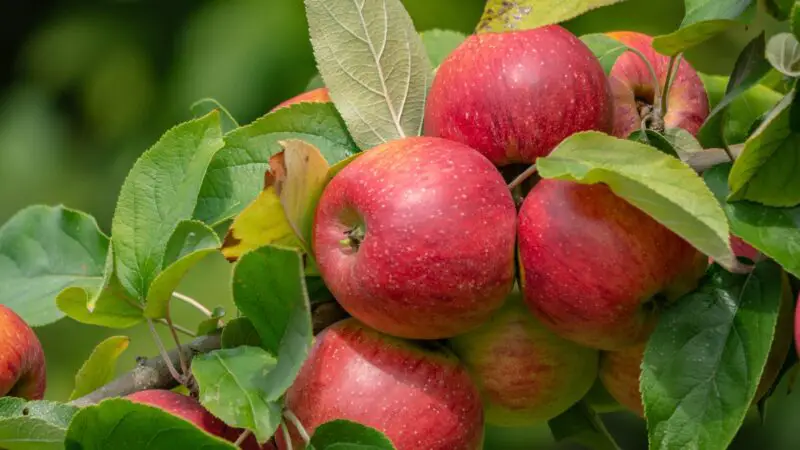
Apples and apple pomace are great temporary replacements for corn for beef cattle. This pome fruit has the same energy value as corn but with less crude protein.
Beef cows can be fed 40-60 pounds of chopped apples daily. Pregnant cows in their second trimester of pregnancy can be fed apple pomace in moderation.
2. Bananas
Bananas are rich in calories, carbohydrates, fiber, potassium, starch, and Vitamin B6 that cows need. This sweet fruit helps cows in increasing weight, health maintenance, and milk production.
Interestingly, this important fruit crop is also sometimes used as bait for stubborn cows that don’t want to go home. Rotten bananas are also safe for cows.
3. Blueberries
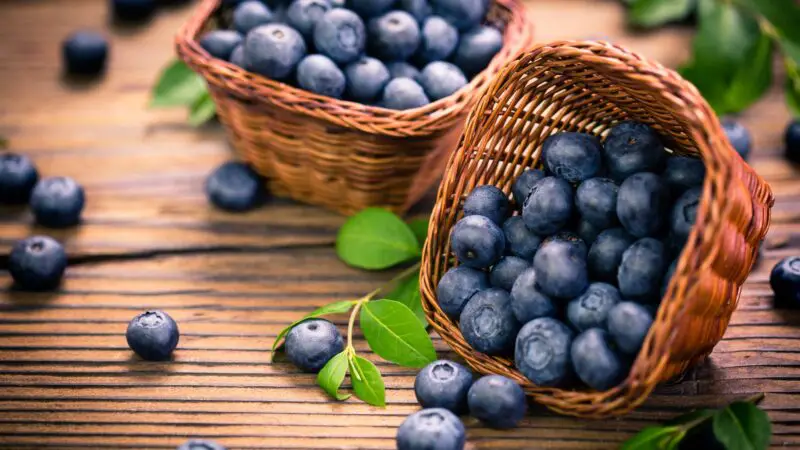
Blueberries are considered a super fruit and are safe for cows. Although low in calories, this healthy fruit is the most nutrient-dense berry and is a great antioxidant.
Although the seeds are not digestible, cows can easily release them once they poop. Yet, unripe blueberries taste sour, and cows are very unlikely to eat too much of them.
4. Corn
Botanically speaking, corn is a grain and a fruit, not a vegetable. Corn has a slightly higher content in energy but is lower in protein compared with other feed grains such as barley, oats, and wheat.
It is also relatively high in phosphorus but low in calcium. But before feeding, corn should be processed properly for the best possible dietary use.
5. Grapes
Fresh grapes are a great addition to the cattle diet. This inexpensive yet nutrient-rich fruit can be easily digested by cows without a problem.
Moreover, grape marc or grape by-product, which is the solid waste left over from pressing grapes into wine, is also safe for cows. This includes grape skin, pulp, and stems, which all are rich in carbohydrates.
6. Kiwi
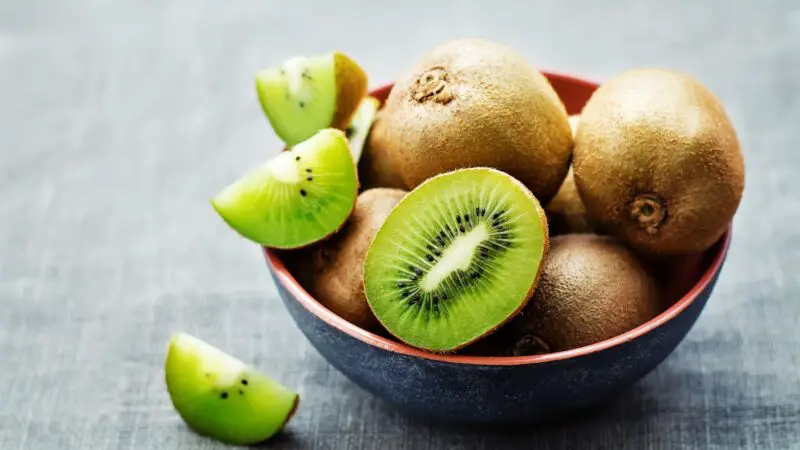
Kiwi fruit is a great source of fiber, potassium, Vitamin C, and other antioxidants for cows. However, cows eating lots of ripe kiwis can suffer from acidosis and may die.
This is because the ripe ones have more soluble sugar than the unripe ones. You should also introduce kiwi to your cattle gradually and start at about only 3-5 kilos of kiwi a day.
7. Mangoes
Being another major crop fruit aside from bananas, mangoes are rich in carbohydrates, fatty acids, and vitamins. This stone fruit also contains protein but is very low (5-10%) and should not be the only food source for cows.
Mango peels are also fine, but the seeds are high in tannins. This anti-nutritional acid can reduce nutrient efficiency in cows.
8. Oranges
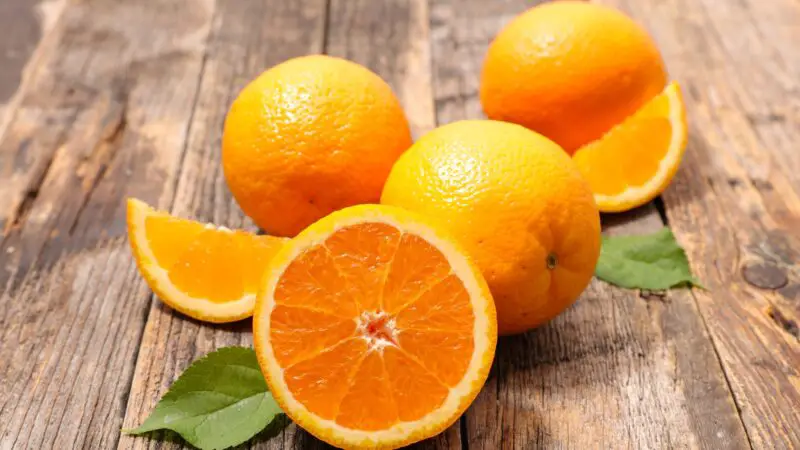
Fresh oranges and those that fell from the trees can be safely fed to cows. But like many other fruits, whole oranges can block the esophagus. Therefore, you should cut oranges before feeding them to cows.
Orange byproducts such as peels also have nutritional value in cattle. However, the recommended daily intake of oranges for cows is only 40 kilos.
9. Pears
As a nutritious citrus fruit, pears are also a great alternative feed for cattle. But because pears are also high in moisture, huge amounts of intake can be very laxative to cows.
Ideally, cows should be fed with pears starting at 2-3 lbs a day only, and the increase should be gradual. Drying is an expensive process, but dried pears are much better for cows.
10. Pineapples
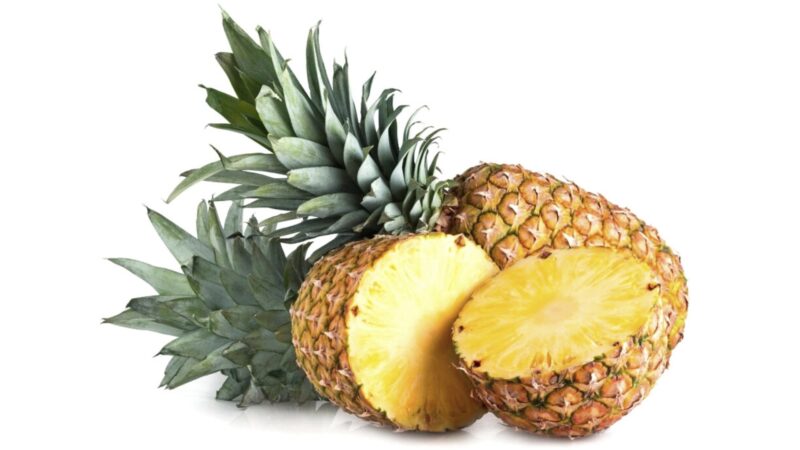
Pineapples are a nutritious feed alternative in cattle since they contain Vitamin C and B6, as well as carbohydrates such as fiber and sugar.
Cows also have very strong jaws and can chew an entire pineapple without showing any adverse effects. Pineapple peels, leaves, and crowns are high in digestible fiber and are also great for ruminants.
11. Plums
Plums are small stone fruits that are closely related to apricots, cherries, and peaches. Dried plums are also called prunes.
When ripe and dried, the fruit itself can be safely fed to cows but only in moderation since it has high sugar content. However, their leaves contain hydrocyanic acid, a hydrogen cyanide solution that can kill cows.
12. Pumpkins
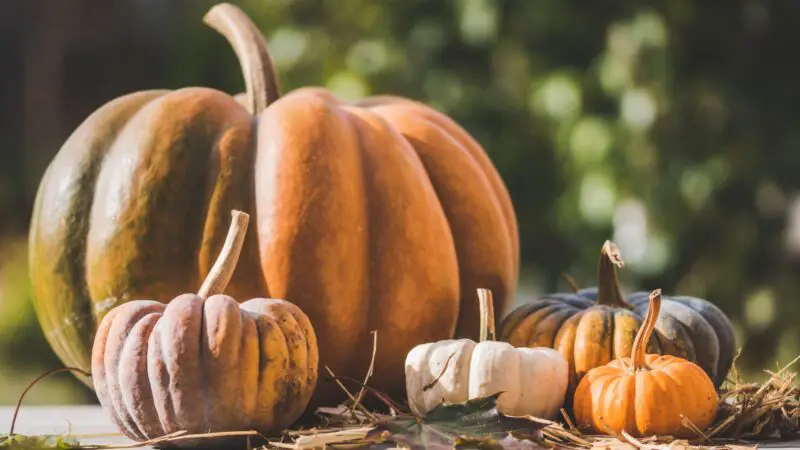
Pumpkins are very palatable in cows and are a good source of supplemental protein for beef cattle. These orange fruits contain 83-88% moisture and 14-17% crude protein.
Therefore, they are great alternative food for pregnant cows, especially in the fall. But then, ripe pumpkin fruits have hard skin, which makes some cows challenging to break.
13. Raspberries
Raspberries and blackberries are types of bramble fruits. Their fruits, stems, and leaves are safe for cows and calves.
Contrary to myths, there is no scientific evidence that raspberry leaf as tea can help shorten labor for pregnant women and cows. But although raspberries don’t pose health risks to ruminants, cows rarely eat them.
14. Strawberries
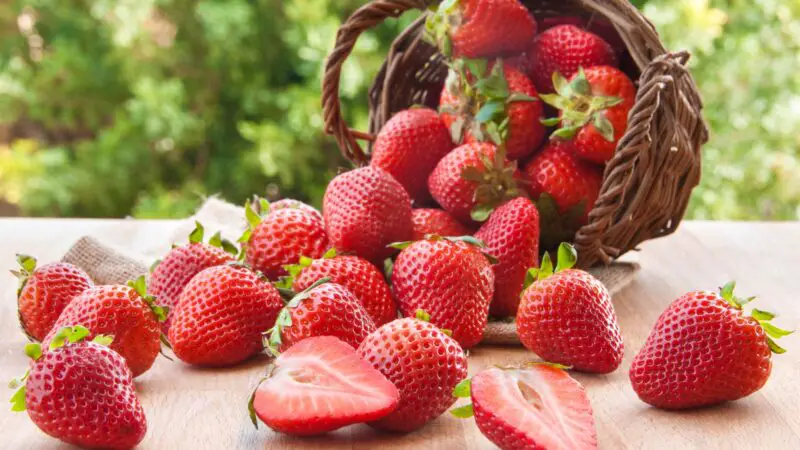
Cows eat strawberries with no problems at all, although it’s impractical to feed them since they are expensive. But during the lockdown due to the coronavirus, crop farmers were forced to feed strawberries to cows instead of throwing them away. As we all know, production and harvests have been disrupted, and strawberries are perishable fruits.
15. Tomatoes
A few ripe tomatoes are generally healthy and safe for cows since they contain the same protein content as high-quality hay. In low amounts, ripe tomato byproducts such as peels and seeds also don’t cause any health issues in cattle.
On the other hand, green and unripe tomatoes contain solanine-like glycoalkaloids that are toxic to cows.
16. Watermelons
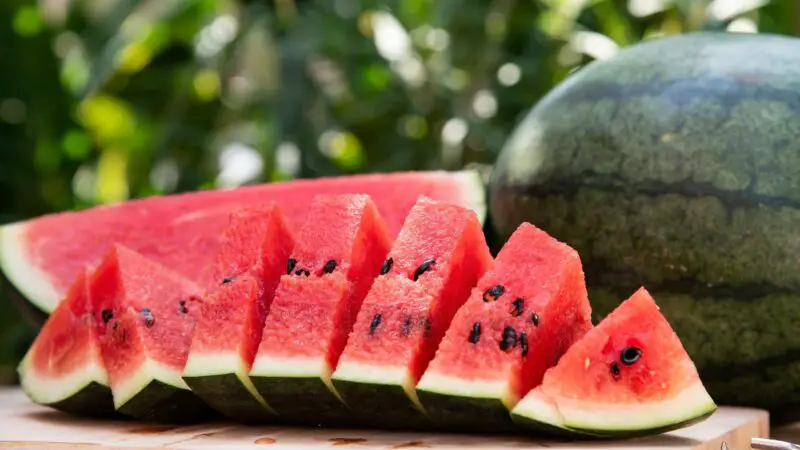
Watermelons can be safely used as cow feed, including the rind or green skin. There’s nothing wrong with cows eating watermelons, but this succulent fruit is low in calories and nutritional value compared to hay.
So, in drought seasons when hay is not enough, try giving your cows some watermelons. Just don’t rely on them completely.
Fruits That Are Not Safe For Cows
Not all fruits are safe as cattle feed. Some of them contain poison, such as cyanide that can kill cows. For the same reason, fruit pits and leaves should not also be fed to cows.
Nevertheless, others are edible for cows but in very low amounts only. To give you an idea, below are some common fruits that cows should not eat or even be near them.
1. Acorn
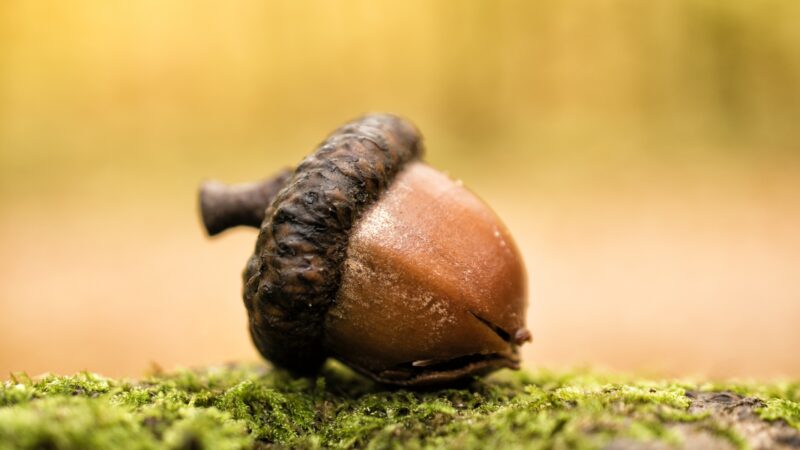
Acorns (oak nuts) contain tannins that can poison cows, especially green leaves. Tannic acid poisoning in cattle can lead to diarrhea, dehydration, increased thirst, frequent urination, general weakness, lack of appetite, serous or watery nasal discharge, and weight loss. In the worst cases, poisoned cows may suffer from kidney failure and die.
Tannic acid toxicity is common to most livestock, but cows are usually the victims. Poisoned cows usually show symptoms several days after eating too many acorns.
If you have cows and there are oak trees around, better install a fence. If your cows have eaten small amounts of acorns, give them a mixed ration with at least 10% hydrated lime.
2. Apricot
The apricot fruit itself can safely be eaten by cows, but not the kernels. Also known as fruit stones, apricot kernels are the inner softer part of the fruit seed.
Although the oil extracted from them is a major ingredient of the Italian liquor, Disaronno, unprocessed and powdered kernels contain hydrogen cyanide (HCN) that can kill cows and humans.
In 2008, twelve cows in Appenzell, Switzerland accidentally ate apricot kernels, and 5 of them showed severe symptoms of cyanide poisoning. Unfortunately, two of them died a few days later.
The other three cows reduced milk production and did not eat for the next 24 hours. Fortunately, they survived and recovered without receiving treatment.
3. Avocado
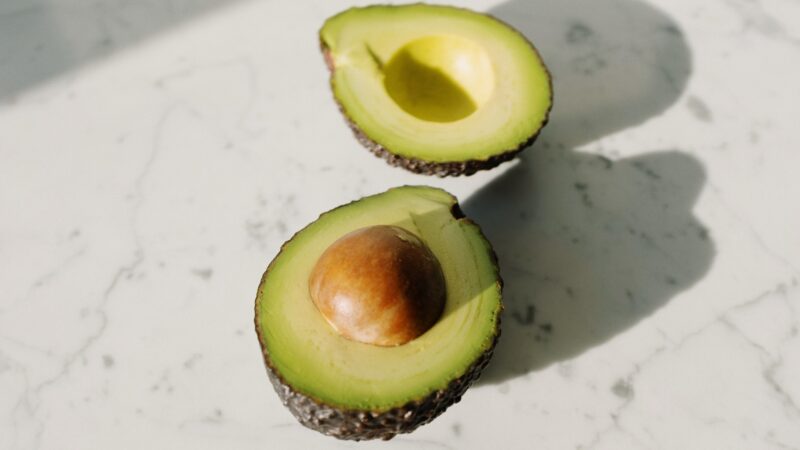
Avocados contain persin that is very toxic to cows and should not be fed to them. In fact, this bright green fruit is also poisonous to many other animals.
This includes chickens, goats, guinea pigs, horses, rabbits, sheep, and turkeys. Cows that ate the fruit, stems, leaves, or seeds of avocados can suffer from myocardial necrosis or heart attack.
Among the symptoms of avocado poisoning in cows include coughing, difficulties in breathing, lethargy, skin swelling, and color changing to blue.
Although there are no official records of cow death due to avocado, it can also occur. There is also no known amount of avocado that can cause cows to get sick, but all parts of the tree have persin.
4. Bitter Almond
Bitter almonds are sometimes confused with apricot kernels, but the former has about 53% less sugar. Also, the latter has a slightly grassy taste.
More importantly, the sale of unrefined bitter almonds is banned in the US due to their high cyanide content. Meanwhile, sweet almonds have very low amounts of cyanide and are sold in the country.
The seeds and fresh, wilted leaves of bitter almond trees also contain cyanide and should not be fed to cows. If properly processed or cooked, the cyanide in bitter almonds will be dissolved.
Yet, it is still not advisable to be eaten by cows. Yet, this nut has a bitter taste, hence the name. Therefore, cows are very unlikely to enjoy eating them.
5. Cashew Apples
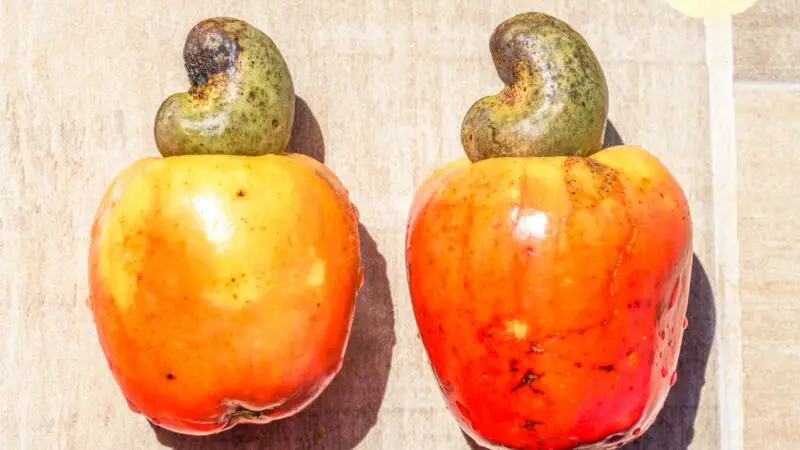
The cashew apple fruit is widely used as livestock feed, especially as cattle fattening diets since it is considered inexpensive. It is also used in producing various foods such as juices and sweets.
Scientifically known as Anacardium occidentale, cashew can be made silage for cattle when mixed with dry materials such as rice bran and maize cobs.
But then, cashew nuts have high sugar content, which is not good for cows in huge amounts. A study conducted in Brazil revealed that some cows on different farms got poisoned after eating cashews.
The fresh nuts had ethanol in the rumen after being fermented, which caused some cows to be intoxicated. The cases were not lethal, though.
6. Cherry
Cows can safely eat cherry fruit, but not the seeds and leaves. Cherry seeds have a hard pit surrounding them and can be swallowed as a whole without health risks.
But once broken and swallowed, cherry pits can lead to poisoning. This is because they contain certain amounts of amygdalin, a chemical compound with cyanide toxicity.
Also known as a cyanogenic glycoside, amygdalin is converted into hydrogen cyanide (HCN) once ingested. Although cyanide can also poison humans, ruminants such as cattle are very susceptible to getting poison from it.
Cows weighing about 1,200 lbs that ingest 1-4 grams of cherry plant material (especially leaves) can already be poisoned.
What Vegetables Can Cows Eat?
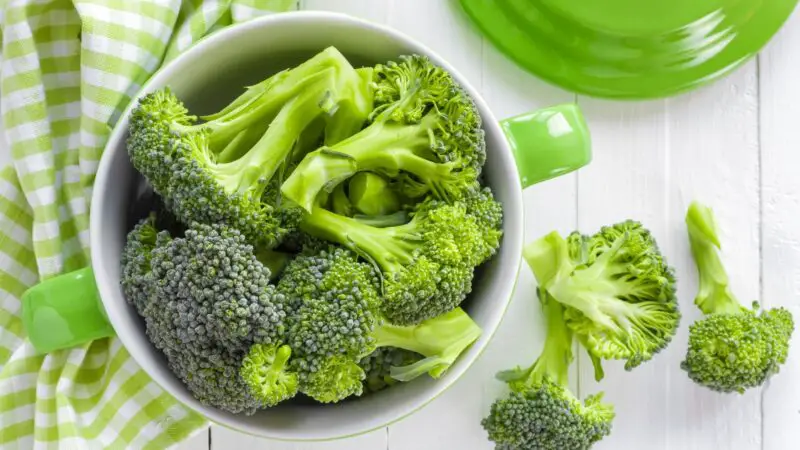
Generally speaking, cows eat all kinds of vegetables. No wonder most farmers feed their cows with cull vegetables or those that are no longer fit for selling.
However, cull vegetables have low-fat content and have lost most nutrients. Fresh vegetables should also not be used as primary feed. Meanwhile, here are some vegetables that cows eat:
- Broccoli
- Brussel sprouts
- Cabbage
- Carrots
- Cassava (pulp)
- Cauliflower
- Lettuce
- Mustard
- Potato (not the green ones)
- Radish
- Turnip
Can Cows Choke on Apples?
Cows can choke while eating apples, particularly the whole ones. This is because cows don’t have upper incisors, and they can swallow a whole apple.
Therefore, cows should not be allowed to go near apple trees since some of them may have fallen to the ground. If you will feed cows with apples, make sure you break them into small pieces.
Can Cows Eat a Raw Banana?
Cows can eat raw bananas. Although it’s quite unlikely that they find bananas on the ground during pasture walks, cows enjoy eating them.
Interestingly, cows also eat rotten bananas as part of their treats without getting sick. After all, both fresh and rotten bananas have the same nutritional value, and cows won’t mind the difference in taste.
Can Cows Eat Banana Peels?
Cows can safely eat banana peels. Banana waste, such as peels, has significant amounts of glucose, which is great for the milk production of lactating cows.
They also contain dietary fiber, polyunsaturated fats, potassium, and essential amino acids. This means that you can give unpeeled bananas to cows to help them grow healthier.
Can Cows Produce Milk With Strawberry Taste?
Contrary to rumors, cows cannot produce milk that tastes like strawberries. Although strawberry-flavored milk is a good idea, it is not possible since fruit flavors don’t last long.
But interestingly, a study in Australia suggested that cow’s milk and meat had a raspberry flavor. This is after the cows were fed with oat and sunflower seed supplements.
List of Sources
Citrus By-Products for Animal Feed
Feeding Apples or Apple Pomace in Cattle Diets
Weird Things Cattle Eat and It Is Perfectly Ok
